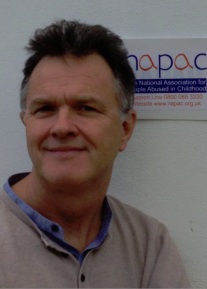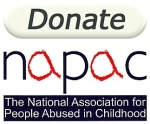To my astonishment and embarrassment , Peter Saunders is waiting at the entrance of the building where the NAPAC offices are, near the Oval tube station in South London. We’re running a little late (my fault) but Peter greets us with a big smile and a handshake and this is indicative of pretty much everything you need to know about Peter. Given that over the past year he has made numerous television news appearances for the BBC, ITV, Channel 4 and Sky, and that he is oft-quoted in newspaper articles concerning developments in high-profile historic child abuse investigations, you’d have thought that the man would have developed an ego but there is none to be found.
I apologise to Peter for our lateness and we chat as he takes us to the second floor where NAPAC has its offices. On the way, Peter points out the room where volunteers are taking phone calls from survivors but we don’t go in. I try to sneak a peek through the window in the door as we pass but screens hide the volunteers from curious eyes. We arrive at the main office and meet Anne, the fundraiser for NAPAC, who offers to make tea. It feels to me a little like a family organisation, like you’re being welcomed into someone’s home rather than into the offices of a charity which has seen its public profile rise manifold since the Jimmy Savile revelations became public just over a year ago.
Talking to Peter, I get the impression that although he must be aware that NAPAC is no longer a low-profile charity in the shadow of the NSPCC, it just hasn’t changed him or anyone involved with NAPAC one iota. Nevertheless, over the last year I’ve received a large number of emails from survivors of child abuse who have criticised the ‘big’ charities like the NSPCC and Barnardos and I’m determined, given this opportunity, to put those criticisms to Peter Saunders on behalf of those that have raised those concerns with me.
After a gentle start to the interview, I ask him whether or not it was a fact that the very existence of NAPAC was indicative of the failures of the NSPCC, Childline and Barnardos? That if these three, well-funded charities had done their job correctly, then there would be no need for NAPAC? Peter takes a short while before replying. “There is no doubt that many organisations have failed children in the past but the important thing now is that we all address the issue of child abuse and work together from this point onwards.”
“Some of the people who’ve contacted me”, I point out, “wouldn’t just describe some of the actions of these big charities as ‘failures’, many actually hold them responsible for the abuse that they suffered. I’m thinking especially about Barnardos homes but Childline seems to have been constitutionally unable to give practical help to children suffering abuse and the NSPCC appears to have papered over the cracks.”
“I hear what you’re saying and I’m not going to defend the indefensible. Obviously, we’ve had survivors come to NAPAC and they’ve said similar things to us but I think that it is now recognised and understood by those organisations. In big, corporate organisations like these charities it is difficult to have control over every employee and every action of every employee.”
“Isn’t that a great advertisment for small, independent charities like NAPAC ?”
Peter Saunders takes a long look at me, I think he’s realised that this isn’t going to be a straightforward interview. “There are obviously advantages to being a small charity just as there are advantages to being a big charity.” he replies
“Money? Resources?”
Peter laughs, “NAPAC could certainly do a great deal more for survivors of child abuse if we had even a tiny fraction of the money that the big charities you’ve mentioned receive but then I think we are trusted more by survivors specifically because we are independent.”
I mention the Operation Yewtree ‘Stakeholder Group’ and point out that, initially, when the police first sought help following the Savile revelations, they partnered with the NSPCC and Barnardos, both of which are child protection organisations. NAPAC, the only national organisation focused on supporting adults who have been abused as children, was excluded.
“I don’t think it’s helpful to dwell on these things. A journalist noticed NAPAC’s absence at an early Yewtree Press Conference and questioned why there was no representation for adult surviors of abuse. Very soon afterwards, NAPAC was invited to become part of the Yewtree ‘Stakeholder Group’. Since then NAPAC has provided training for NSPCC telephone helpline staff who were used to dealing with children and not adult survivors of abuse.”
I then brought up the subject of a recent Guardian ‘infomercial’. I notice that Peter’s posture, which had been relaxed and open until this point, stiffens. “It was approved by the NSPCC”, I say, “and it repeated the fallacy that a large percentage of victims of child abuse go on to become abusers themselves.”
He admits that he’d seen the article. “Well, it’s completely untrue. I know that survivors of child abuse, those that have been abused, are actually less likely to abuse children. A person who has been abused as a child knows exactly the damage it causes and is statistically therefore less likely to pass that on to someone else.”
“But the NSPCC paid for that article.” I point out.
“I know, and I’ve raised this issue with with both the NSPCC and The Guardian. It’s is not right that survivors of childhood sexual abuse should endure the stigma that they are potentially likely to be child abusers themselves. As a survivor myself it makes me very angry and I’d have thought that the NSPCC and The Guardian would know better.”
“I’ve heard it suggested that child abusers often say that they were abused themselves as a way of mitigating against their own abuse?”
“Exactly!” Peter rejoins, “there is absolutely no evidence that this is true and as I said it is not my own experience having spoken personally to many survivors. I’m angry that the NSPCC has said this.”
“What about your future Peter ?” I venture, “Over the last year, if you exclude paid commercials, you’ve had a greater media profile on behalf of NAPAC than any of the children’s charities. Would you consider heading an organisation like the NSPCC?”
Peter visibly relaxes again and laughs, “They’d never appoint me.”
“But isn’t it about time that a survivor of child abuse themselves heads the main organisation seeking to prevent child abuse?”
Peter pauses and looks at me without answering.
Unperturbed I press the point, “Let’s say you were given the job, what would be the first thing you did?”
Again Peter laughs, “That’s easy”, he replies, “I’d demand a 50% pay cut!”
Well, he’s got my vote.
Do we get a vote?
If you would like to make a donation to NAPAC then you can either click on the donate button on the top right on The Needle or you can visit their website http://www.napac.org.uk/ where you will also find out how you can volunteer your time to support survivors of child abuse.
If you have information connected to Operation Fairbank/Fernbridge you can call them direct on 0207 161 0500
Or you can contact NAPAC on 0800 085 3330 free from landlines, 3, EE, Vodafone and Virgin mobile phones or 0808 801 0331 free from O2, EE and Vodafone mobile phones.




Pete Saunders just on 5live again discussing polygraph tests.
Great post. Had personal dealings with NAPAC via my work in publishing, I’ve nothing but admiration for them.
It does seem a fact that in all the years of NAPAC’s existence they had never once had cause to mention Jimmy Savile – until after he was dead.
Great piece, but I know how to stop this post appearing. Whilst Rantzen is a patron I will not be donating.
She was given the elbow by the looks of it? – http://www.disclose.tv/forum/esther-rantzen-sacked-in-wake-of-savile-scandal-read-more-t79718.html
Was this reversed?
“It is not right that survivors of childhood sexual abuse should endure the stigma that they are potentially likely to be child abusers themselves.”
This is apparently a myth referred to here as the “vampire syndrome”:
http://www.malesurvivor.org/myths.html
“While it is true that most perpetrators have histories of sexual abuse, it is NOT true that most victims go on to become perpetrators. Research by Jane Gilgun, Judith Becker and John Hunter found a primary difference between perpetrators who were sexually abused and sexually abused males who never perpetrated: non-perpetrators told about the abuse, and were believed and supported by significant people in their lives.”
http://kids.delaware.gov/fs/fs_iseethesigns_learn.shtml
“Research by Jane Gilgun, Judith Becker and John Hunter has indicated that if a child discloses an incident of abuse early and is believed and supported by other close people in their lives, they have a much higher likelihood to not become perpetrators as adults.”
Perhaps it is also logical that an adult who does not reveal they were abused until adulthood would also be less likely to be an abuser, as by disclosing it they have recognised that it was abuse rather than behaviour which they would consider acceptable to inflict on others.
the theory of the abuse cycle leads to abusers being treated as victems.
and victims treated as abusers.
theirs absolutely no evidence for it and it has no place in modern discussion of abuse.